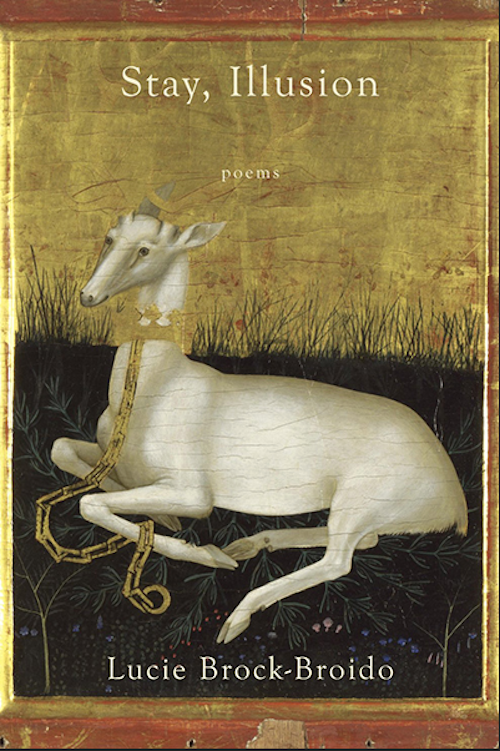The Vow to Be a Poet: Lucie Brock-Broido in Conversation at Guernica

The good editors at Guernica have published this fantastic interview with National Book Award finalist Lucie Brock-Broido. She provides insights on becoming a poet, vows she's made to herself, her writing process, and she discusses her most recent book Stay, Illusion. The conversation begins with Brock-Broido describing the decision early in her life to leave "the real world" to become a poet:
Lucie Brock-Broido: I came to poetry because I felt I couldn’t live properly in the real world. I was thirteen and in Algebra class. That was the day I decided I would be a poet for all time. I walked out of class and dropped out of school. That doesn’t mean I became a poet, but I did have this absolute severance with one period of my life where I felt I was being made to live in the world I was brought into—Straight-A student, The Most Perfect Little Girl—that I couldn’t inhabit anymore. And so I went to a place I felt I could inhabit which turned out to be, as we know about poetry, more hellish than the one I left!
Guernica: Were there poets whose work you were drawn to, back then?
Lucie Brock-Broido: The poetry I was taught in school was useless, save for Dickinson. I did not really fathom Dickinson until I turned thirty. My early reading was mostly in theater. When I walked out of school I joined a theatrical troupe where I grew up in Pittsburgh. We did Genet, Brecht, and Strindberg. I stopped my love affair with theater because I had irrevocable stage fright, which I still have. What I do with my life now is manage my stage fright, because when you’re the teacher, you have to be Miss Julie or Solange in The Maids. You have to live inside The Caucasian Chalk Circle. Or become Miss Jean Brodie “in the prime of her life”. Or become Jane Fonda in Barefoot in the Park.
After discussing what Brock-Broido finds to be compelling in poetry— "Real speech: what people say and what’s withheld from being said is of the essence to me. In real speech, that which is withheld hurts. On the page, that which is withheld is the most pure form of speech."—the conversation turns toward the difficulties and rewards of composing poetry and having it published:
Lucie Brock-Broido: There is not a poem in Stay, Illusion that happened easily. If each poem were a crime, they were premeditated beyond the first degree (with extenuating circumstances to boot). As a writer, I am hard on myself. I write so much more than I would ever publish. I don’t write manically, the way I did when I was in my twenties, when I was writing 300 poems a year and I would just conjure up the verses every night.
Now each poem must be, as Larkin wrote, its own sole, freshly created universe. At the heart of my life is the idea that I don’t ever want anything to ever change. That’s the basic tenet. This is not a very smart way to live, because that is the only thing you can’t change: that every thing is changing every minute. My title is a plea to the heavens, to fathers, to ghosts, to masters and the mistresses. I used to possess a quality that the fiction writer Charles Newman told me I was the essence of—radiating naiveté—many years later I wrote a poem with that as a title. I may have a lot of radiance, but my naiveté has been replaced by …
Guernica: Wonderment?
Lucie Brock-Broido: No. Wisdom, I think. Which is a quality I am strangely ambivalent about. Wonderment I take as a word that implies luminosity, and I’m interested in that. But of some different metallic kind because my poems are troubled into being.I think the reason I’ve published so few books is that I have a pretty high expectation of self-reinvention between books and I would prefer to have been in this world and published fewer works than I would publishing the books that would reveal the process of the changes. I have left many tracks in the snow in this book though—about transition and change, on purpose, wittingly, and with some embarrassment—because I don’t like to change in front of anyone.
Make your way over to Guernica for the rest of the interview—it's worth it!


